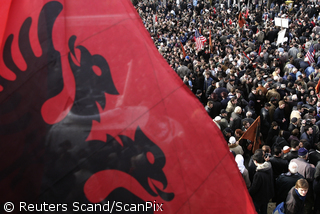Foreign investment flows into Russia plunged to $1.3 billion last year from $20.8 billion in 1998, the Central Bank of Russia reported.
Published:
14 May 2000 y., Sunday
Foreign direct investment rose to $2.9 billion in 1999 from $2.8 billion in the previous year, balance of payments data in the Central Bank's newsletter show. But the outflow of portfolio investment reached $900 million, compared to an increase of $8.3 billion in such foreign investment in 1998.
Foreign loans and credits to the government sector totaled $2.7 billion last year, down from $6.7 billion in 1998. This included $1.3 billion in untied financing: about $1.0 billion in loans from international financial organizations and a loan of $0.3 billion from the Japanese Bank for International Cooperation. Actual government payments on foreign loans and credits totaled $7.2 billion ($5.6 billion on the principle and $1.6 billion in interest), out of the $12.2 billion due; about $3.0 billion in payments were overdue. The proportion of foreign equity ownership in the Russian commercial banking system increased by 70% to 10.7% as of January 1, 2000.
Foreign direct investment into this sector rose to $0.5 billion (including subordinated credits) from an estimated $0.3 billion in 1999.
Last year $11.7 billion in cash foreign currency was brought into Russia (down from $20.7 billion in 1998), including $8.3 billion by the banking system. At the same time, $12.6 billion was taken out of the country ($21.6 billion in 1998), including $5.4 billion through unregistered trade (shuttle traders) and $5.3 billion by tourists. The official foreign currency reserves increased by $1.8 billion in 1999 as a result of operations reflected in the balance of payments.
Šaltinis:
Interfax
Copying, publishing, announcing any information from the News.lt portal without written permission of News.lt editorial office is prohibited.
The most popular articles
 Women in the EU earn on average 18% less than men - a gap that has scarcely narrowed over the last 15 years and in some countries has even grown.
more »
Women in the EU earn on average 18% less than men - a gap that has scarcely narrowed over the last 15 years and in some countries has even grown.
more »
 43 gas and electricity projects to split €2.3bn, the most the EU has ever spent on energy infrastructure in a single package.
more »
43 gas and electricity projects to split €2.3bn, the most the EU has ever spent on energy infrastructure in a single package.
more »
 Georgia and the European Union have initialled a comprehensive air services agreement at a meeting in Tbilisi, Georgia, today which will open up and integrate the respective markets, strengthen cooperation and offer new opportunities for consumers and operators.
more »
Georgia and the European Union have initialled a comprehensive air services agreement at a meeting in Tbilisi, Georgia, today which will open up and integrate the respective markets, strengthen cooperation and offer new opportunities for consumers and operators.
more »
 In order to vitalize and strengthen cooperation of business stakeholders in the region, the Nordic and Baltic countries continue running joint mobility programme.
more »
In order to vitalize and strengthen cooperation of business stakeholders in the region, the Nordic and Baltic countries continue running joint mobility programme.
more »
 The EBRD is boosting the availability of financing to the real economy sector in Serbia, with a €20 million credit line to Société Générale Serbia for on-lending to small and medium enterprises.
more »
The EBRD is boosting the availability of financing to the real economy sector in Serbia, with a €20 million credit line to Société Générale Serbia for on-lending to small and medium enterprises.
more »
 The EBRD is supporting the development of the private sector in Armenia and increases further the availability of financing in the real economy sector with a $10 million loan to Ameriabank for on lending to local companies under its Medium Sized Co-financing Facility (MCFF).
more »
The EBRD is supporting the development of the private sector in Armenia and increases further the availability of financing in the real economy sector with a $10 million loan to Ameriabank for on lending to local companies under its Medium Sized Co-financing Facility (MCFF).
more »
 The EBRD is supporting the modernisation and improvement of transport infrastructure in Albania with a €50 million sovereign loan to finance the rehabilitation of regional and local roads in the country.
more »
The EBRD is supporting the modernisation and improvement of transport infrastructure in Albania with a €50 million sovereign loan to finance the rehabilitation of regional and local roads in the country.
more »
 Given the deep impact Latvia has suffered in the wake of the global crisis, and due to the emergency nature of this program, the first operation will focus mainly on the first and second objectives.
more »
Given the deep impact Latvia has suffered in the wake of the global crisis, and due to the emergency nature of this program, the first operation will focus mainly on the first and second objectives.
more »
 Mr. Dominique Strauss-Kahn, Managing Director of the International Monetary Fund (IMF), will visit Africa March 7-11, to discuss opportunities and challenges facing African economies in the wake of the global crisis.
more »
Mr. Dominique Strauss-Kahn, Managing Director of the International Monetary Fund (IMF), will visit Africa March 7-11, to discuss opportunities and challenges facing African economies in the wake of the global crisis.
more »
 Without enough money, the EU 2020 strategy risks turning into "another vague scoreboard for the Member States", the EP Budgets Committee warned on Thursday when adopting its priorities for the 2011 budget.
more »
Without enough money, the EU 2020 strategy risks turning into "another vague scoreboard for the Member States", the EP Budgets Committee warned on Thursday when adopting its priorities for the 2011 budget.
more »